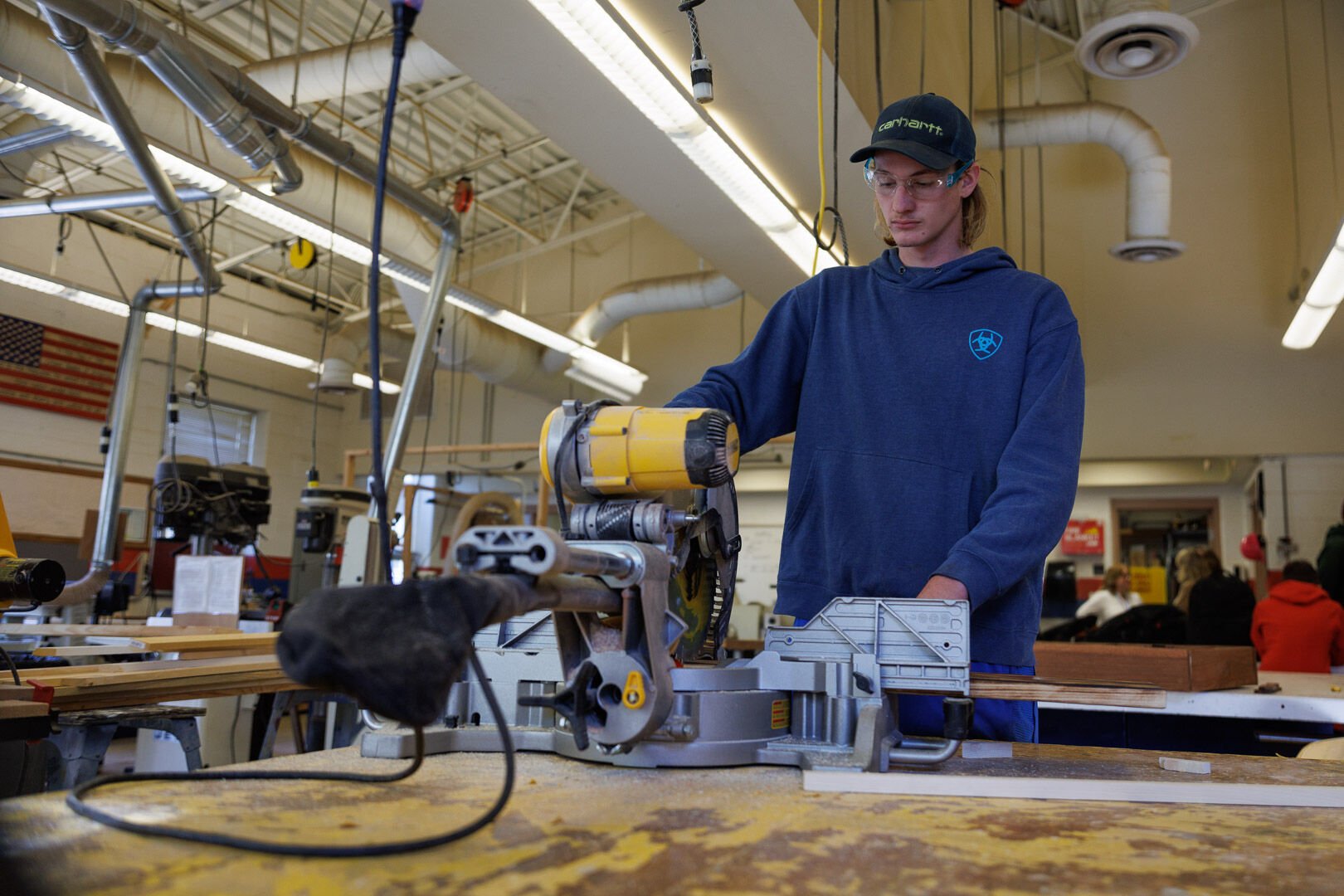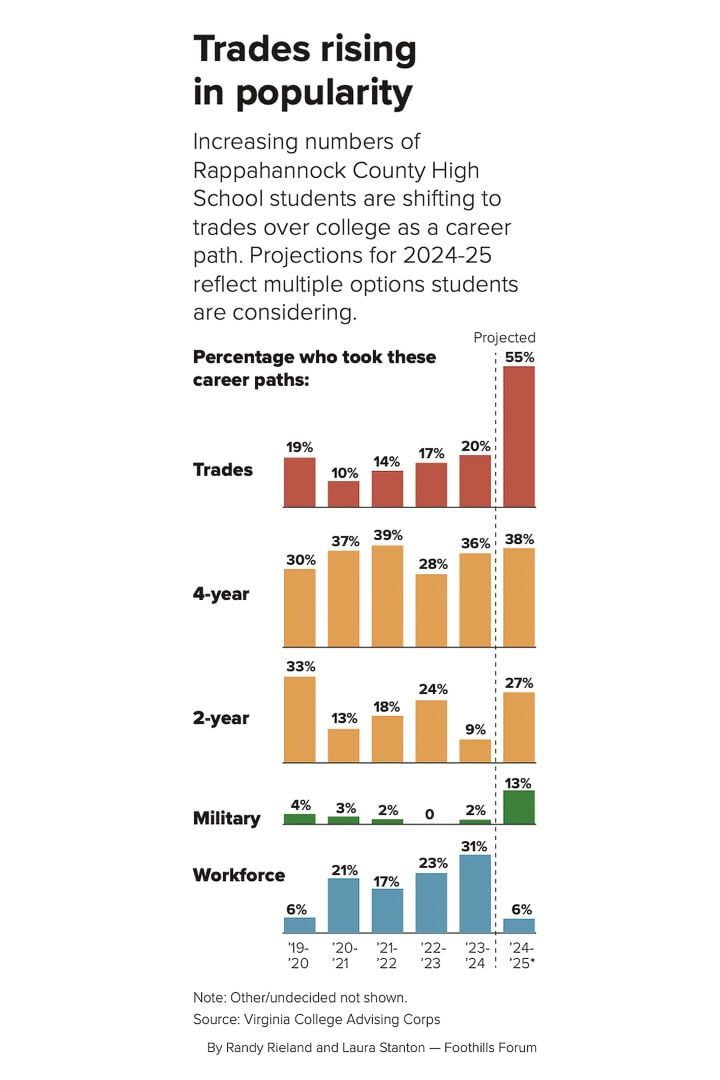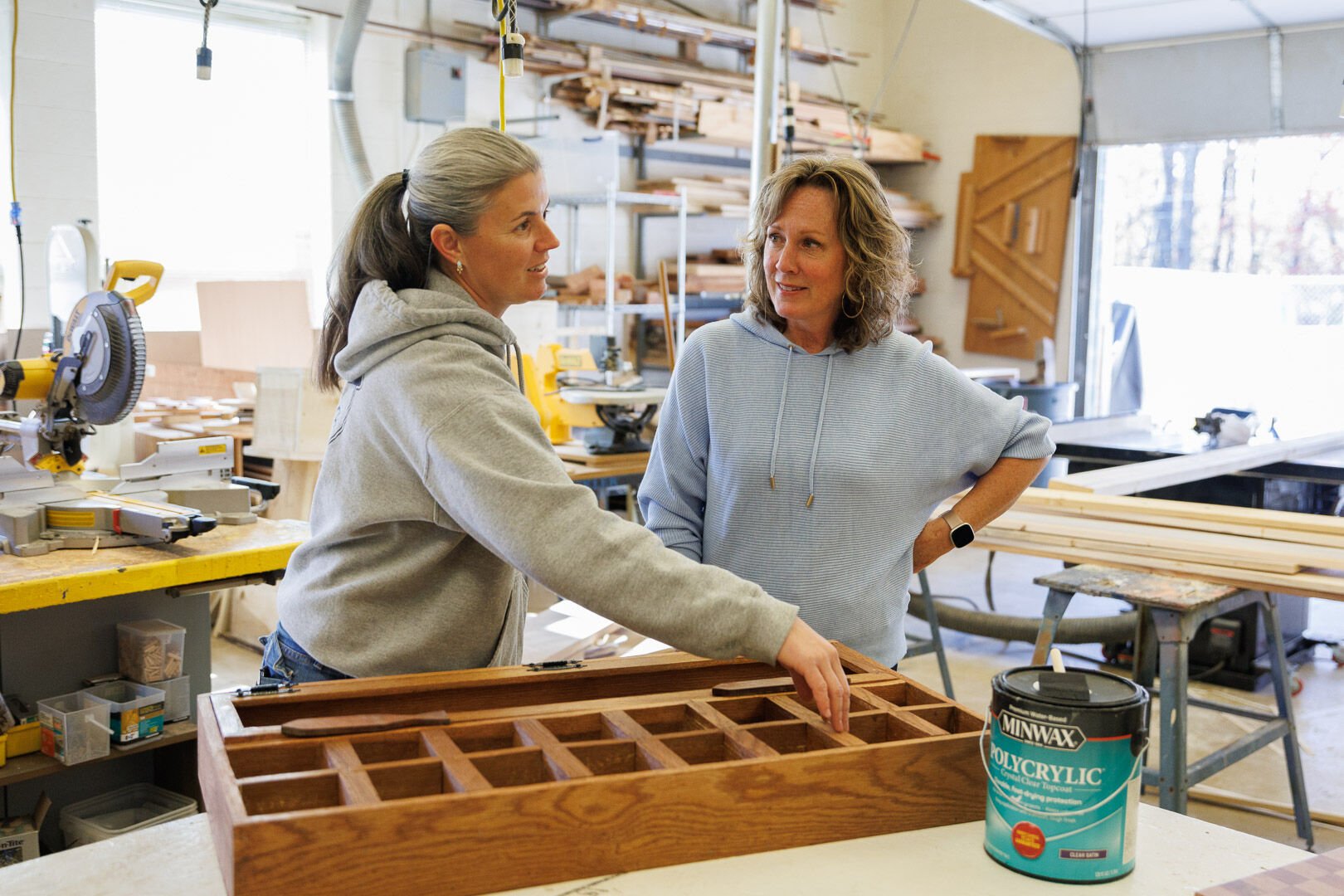Rappahannock students opt for ‘hands on’ careers
It wasn’t that long ago, remembers Dani Pond, when conventional wisdom had it that if you wanted a good career, you better have a degree from a four-year college.
“It didn’t matter what degree,” said Pond, supervisor of student counseling at Rappahannock County High School (RCHS). “You could get a degree in anthropology. Because if you had a degree, you were going to get a job.”

2024-10-28-FF-Trade-Program-4-web.jpg
Scott Woodward, a senior at RCHS works on a custom cedar inlay for the stairs on shed the students are building for auction ay the building trades classroom.
Shaun Summerscales, principal of the Culpeper Technical Education Center, put it more bluntly, “The feeling was either a four-year degree or you’d be living in a van down by the river.”
But that either/or thinking is fading as today’s high school students weigh their futures. More are choosing to get training and earn certifications in such trades as plumbing, HVAC, welding and operating heavy machinery, instead of following a four-year college path.
A recent survey conducted by the Harris Poll found that almost 80% of Americans say they’ve noticed the growing popularity of trades among young adults, and roughly one in five of those surveyed said they now view trade jobs more positively than corporate positions.
It’s a trend playing out at high schools in the region. According to Pond, more than half of the current seniors at RCHS have expressed interest in entering a trade – although they all haven’t yet made firm commitments.
This semester Rappahannock students have begun taking training courses at the Skilled Trades Center, which opened at the Fauquier Campus of Laurel Ridge Community College last year. Seven RCPS students are enrolled in HVAC classes. At least four more are signed up for plumber training there next semester.

tradechart.v4FINAL-Enhanced-SR-web.jpg
The fast-track program – courses last from eight to 12 weeks – enables students to start earning a trade certification while still in high school. In Fauquier County, they also are “seeing a strong interest in trade and vocational pathways across all our high schools,” according to Erica Yelland, the school district’s director of communications.
Lisa Heiser, a career coach in the Workforce Solutions Program at Laurel Ridge, shared a recent experience she had with a group of 60 students visiting from Page County.
“I was expecting maybe 20 of them to want to pursue some sort of trade,” she said. “But 40 of them did. It was a complete flip-flop of what you would have seen in the past.”
Fear of college debt
A big factor, not surprisingly, is the escalating expense of getting a college degree. The average total cost for a student living on campus at a public four-year university in the United States is now more than $27,000 per year for in-state students, and almost $46,000 per year for out-of-state students, according to the Education Data Initiative, a foundation that tracks data about the country’s education system.
“It’s so expensive,” said Heiser. “And kids see older brothers and sisters, or aunts and uncles who have tremendous debt associated with their degree, and they don’t have jobs that can sustain that debt and also pay their bills. So kids are looking at it differently.”
Rappahannock County Supervisor Donna Comer, who represents the Jackson District, has seen firsthand the shift toward the trades. She works in a “liaison” position connecting the Workforce Solutions Program at Laurel Ridge and the Fauquier County Department of Economic Development, particularly when it comes to fulfilling the manpower needs of groups like the Heavy Construction Contractors Association, a nonprofit representing firms involved in major building projects in the Washington metropolitan area.

2024-10-29-FF-Trade-Schools-3-web.jpg
Jackson District Supervisor Donna Comer works in a “liaison” position connecting the Workforce Solutions Program at Laurel Ridge and the Fauquier County Department of Economic Development.
But she also has a more personal perspective. “I have a daughter who’s 28 years old and a son who’s a junior at Rappahannock High School,” Comer said. “And I can tell you that as a parent, the conversation with my son about what he does after high school is going to be so different from the conversation we had with our daughter.
“Having worked at the college for a few years, I really understand that the pathway to success looks different for every single person,” she said. “So, as parents and educators, we need to pay attention to that and change the conversation.”
Pond and Jenny Kapsa, who works with her on the Profile of a Graduate team at RCHS, say more students seem focused on kickstarting careers that enable them to start earning a decent income sooner, rather than later.
“I think a lot of kids are looking for more of a fast track,” said Pond. “They’re ready to work, ready to become productive earners. And they’re not wanting to invest two or four years before they start seeing a return.”
Refilling a pipeline
Another reflection of the rising popularity of trades training: The Rappahannock Lions Club is providing financial aid to students, including recent graduates, who take courses at the trades center. For years, the Lions Club has offered scholarships to students going to four and two-year colleges. In fact, this year it bumped up that support to $28,000, split among seven students going to college.
But it also has committed to helping cover a chunk of the cost of training to earn a trade certification.The fee for the HVAC course at Laurel Ridge, for instance, is about $3,800, but state job training grants can lower that amount to roughly $1,200. The Lions Club would pick up 90% of the balance, reducing a student’s cost to about $120.
“One thing that has made me very happy is that we are recognizing the trades,” said Lions Club President Mary Graham. “We give college scholarships to students going into service fields. But honestly, people with HVAC or plumbing skills can serve this community, and we might be able to keep more of them here.”

2024-10-29-FF-Trade-Schools-1-web.jpg
Rappahannock resident and Trades Faculty Coordinator Darren McKinney demonstrates using an excavator with a simulation machine at the Skilled Trades Center at Laurel Ridge Community College.
The need for those with trades skills has only intensified since the coronavirus pandemic when many older, experienced people in those fields decided to retire, a trend that became known as the “silver tsunami.”
But even before COVID, it had become clear that the pipeline for skilled workers in certain fields, such as heavy machinery operators, was drying up.
“It used to be that the construction industry could source its equipment operators from farm kids who had grown up,” said Debora Harvey, executive director of the Heavy Construction Contractors Association. “But there just aren’t that many out there any more.”
So, the organization began working with community colleges like Laurel Ridge to set up training programs. That effort also included making sure that high school counselors became more aware of post-graduate opportunities other than four or two-year colleges.

2024-10-28-FF-Trade-Program-8-web.jpg
Laurel Ridge Career Coach Michelle Barrett with seniors Aiden Stoner, Vinny Hendricks, Scott Woodward, Cody Marcus and Gavin Jeffries.
At the same time, newer fields are expanding rapidly. Laurel Ridge, for example, recently began offering a course in fiber optic installation. Not only are installers needed to meet the demand for high-speed internet and phone service in rural areas, but they also are a critical part of the workforce erecting the data centers spreading throughout Northern Virginia.
“With the data centers that are coming, we will need more than 5,000 employees in Culpeper County to help put them up. And those are tradesmen jobs,” said Randi Richards-Lutz, director of Career and Technical Education for Culpeper County Public Schools.
As in Rappahannock, student interest in the trades is growing in Culpeper’s public high schools. The number of last year’s graduates going into the workforce is almost double what it was five years ago, while those enrolling in four-year colleges has dropped by about 20% during the same period. The school district’s Technical Education Center opened only three years ago, and several fields of training already have waiting lists, according to Richards-Lutz.

20241028-FF-Trade-Programs-00337-web.jpg
Kristina Farnham, Building Trades and Engineering Technology instructor and Jenny Kapsa who works on the Profile of a Graduate team at RCHS at a trade class.
She described the shift as a “true culture change,” one that requires a persistent effort to educate the public, particularly students’ parents. She said it helps to give parents a tour of the center: “We want them to think, ‘This isn’t what it was like when I was in high school.’”
Hands-on appeal
To ensure that Rappahannock students are aware of as many postgraduate options as possible, the high school now has monthly seminars at which tradespeople talk about their careers.
Michelle Barrett, a Laurel Ridge career coach stationed at the high school, was pleasantly surprised by the reaction. “Since then, I’ve been having all these kids come in, and they want to get more information and learn more about trades. Even some freshmen have come in.
“The older students speak to me a lot about wanting to have a consistent job,” she added. “They’ve heard about college students who graduate and can’t find a job.”
Scott Woodward is a case in point. He’s a senior at RCHS and wants to start working as soon as he graduates, ideally as a welder. He’s taking a welding course at the high school with the goal of getting his certification.

2024-10-28-FF-Trade-Program-3-web.jpg
Scott Woodward, left, a senior at Rappahannock County High School, wants to start working as soon as he graduates, ideally as a welder. With him are seniors Vinny Hendricks and Cody Marcus.
Growing up in Castleton, Woodward often worked with his dad, and said he got pretty good at welding. He also saw how many people seemed to need a welder, and now he’s working to get certified.
“I like school,” he said, “but I want to get an apprenticeship where I can actually be hands-on and learn stuff, versus sitting behind a computer screen all day.”
Pond said she’s been asked about the high percentage of students in this year’s senior class who are leaning toward the trades. She noted that based on her team’s conversations with next year’s seniors, that percentage is likely to drop because more juniors are interested in going the four-year college route. But she said a preference for trades doesn’t reflect a class of inferior students.

2024-10-28-FF-Trade-Program-2-web.jpg
Dani Pond, supervisor of student counseling at Rappahannock County High School.
“We have lots of kids interested in trades who are super smart and could go to a four-year college, no problem,” Pond said. “It’s not our job to tell these kids what they should do. They tell us what they want to do, and we help them formulate a plan.
“For some, going to a four-year college is not what they want to do. That’s not what they’re passionate about.
“They’re still furthering their education,” she said. “They’re getting training, they’re getting certifications. To me, that shouldn’t be considered inferior to going to a four-year college. That should be celebrated and recognized.”
Sign up for Rapp News Daily, a free newsletter delivered to your email inbox every morning.

Foothills logo – horizontal
Foothills Forum is an independent, community-supported nonprofit tackling the need for in-depth research and reporting on Rappahannock County issues.
The group has an agreement with Rappahannock Media, owner of the Rappahannock News, to present this series and other award-winning reporting projects. More at foothillsforum.org.












